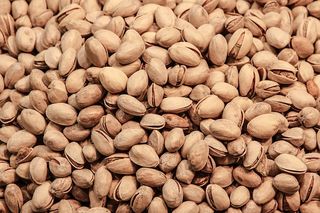Diet
Why Your Doctor Might Prescribe Food Instead of Medicine
New medical research links diet to serious diseases.
Posted May 12, 2017
Does your daily diet include walnuts, almonds and sunflower seeds? What about kale, cauliflower and whole grains like buckwheat and millet?
If not, perhaps you might want to re-think your eating habits. New research published in the Journal of the American Medical Association on March 7, 2017, finds that these foods decrease your risk of dying from heart disease, stroke, and type 2 diabetes. The study, funded by the National Institutes of Health at 27 sites across the country, is the most comprehensive study ever on diabetes prevention.
According to the study, one out of every two deaths from heart disease, stroke or type 2 diabetes are linked to poor diet—that means 1000 deaths per day. Poor diet means too many carbohydrates, sweets and products made from white flour, and not enough fruits, nuts, whole grains and vegetables.

No wonder that some doctors are now meeting with their patients in the kitchen—like Nicole Farmer, M.D. in Maryland, founder of the program “Physician’s Kitchen". In this program doctors meet with patients in the kitchen and instruct them in cooking healthy foods.
According to Dr. David Eisenberg at the Harvard School of Public Health, there is evidence that specific foods keep you healthy and other foods increase the risk of your getting cancer, heart disease and diabetes 2.
Recently, the Harvard School of Public Health got together with the Culinary Institute of America to sponsor a crash course to teach doctors how to build food into their medical practice.

Doctors learned tasty recipes for foods that can prevent and even reverse serious disease.These include recipes to titillate the taste buds and at the same time promote health—like "Tagine Of Salmon With Preserved Lemons And Caper Berries" and "Millet Porridge with Lemon Curd and Sunflower Seeds."
Healthy Kitchens Healthy Lives is a new program for doctors. Surprisingly, few doctors learn about how nutrition affects health in medical school. Less than 20 percent of American medical schools have a single required course in nutrition. Eisenberg calls this a “scandal.”
Fortunately, new research on diet and disease is having an effect. Yale medical school now offers a course called “Culinary Medicine.”
Focusing on diet addresses the root cause of many diseases instead of masking symptoms with drugs. Instead of writing a prescription for medication for diseases like diabetes 2 and autoimmune illnesses, doctors are beginning to send patients home with recipes.
For example, California endocrinologist Sarfraz Zaidi, previously assistant professor of medicine at UCLA, “prescribes” diet for autoimmune diseases like thyroid-eye (Graves) disease and Hashimoto’s Thyroiditis. He has even created a recipe for bread made of almond meal instead of flour made of grain. Zaidi believes that grains like wheat, barley and even quinoa can bring about an autoimmune response in which the body attacks its own tissues. Besides grains, other food culprits that can trigger autoimmune diseases are sugar, alcohol, and caffeine.
If diet can be more effective than medications in preventing and reversing diseases, why are most people resistant to making the dietary changes their doctor recommends?
First, changing eating habits is difficult. Who wants to give up a croissant or sweet roll with their daily coffee? Our palates are accustomed to sugar and caffeine. Second, we are used to coming out of our doctor’s office with a prescription for medicine not a recipe for stir-fried vegetables.
But when our lives are at stake—heart disease, stroke, cancer and diabetes are leading causes of death in the United States—we might well be motivated to reconsider what we eat.
The Greek doctor Hippocrates, recognized as the founder of medicine, famously said "Let food be thy medicine." It seems that modern medical research may once again be proving him correct.
Learn about the role of diet in mental health at Dr. Wedge's 90 minute webinar on September 12, 2017, at 1 PM Eastern time, 10 AM Pacific time. Only $20 For more information and to register, click here


